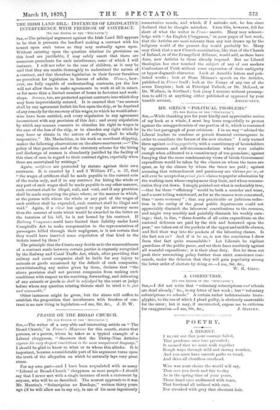THE IRISH LAND BILL: INSTANCES OF LEGISLATIVE I INTERFERENCE WITH
FREEDOM OF CONTRACT.
[TO THE EDITOR OF THE " SPECTATOR:1
Sin,—The principal argument against the Irish Land Bill appears to be that it prevents the landlord making a contract with his tenant upon such terms as they may mutually agree upon. Without entering upon the question whether its provisions on this head are justifiable, I may safely assert that there are numerous precedents for such interference, some of which I will instance. I will not refer to the case of children, as it may be said that they are unable thoroughly to understand the nature of a contract, and that therefore legislation in their favour furnishes no precedent for legislation in favour of adults. Women, how- ever, are fully capable of understanding contracts, yet the law will not allow them to make agreements to work at all in mines, or for more than a limited number of hours in factories and work- shops. Seamen, too, are protected against contracts into which they may have improvidently entered. It is enacted that "no seaman shall by any agreement forfeit his lien upon the ship, or be deprived of any remedy for the recovery of his wages, to which he would other- wise have been entitled, and every stipulation in any agreement inconsistent with any provision of this Act ; and every stipulation by which any seaman consents to abandon his right to wages in the case of the loss of the ship, or to abandon any right which he may have or obtain in the nature of salvage, shall be wholly inoperative." Mr. Maclachlan, in his work on merchant shipping, makes the following observations on the above enactment :—" The policy of that provision and of the statutory scheme for the hiring and discharge of seamen is abundantly justified by the facility of this class of men in regard to their contract rights, especially when these are ascertained by writings."
Again, artificers are protected by statute against their own contracts. It is enacted by 1 and 2 William IV., c. 37, that "the wages of artificers shall be made payable in the current coin of the realm only, and if in any contract for hiring the whole or any part of such wages shall be made payable in any other manner, such contract shall be illegal, null, and void, and if any provision shall be made respecting the place where, or the manner in which, or the person with whom the whole or any part of the wages of such artificer shall be expended, such contract shall be illegal and void." Again, if a client has agreed to pay his attorney more than the amount of costs which would be awarded to the latter on the taxation of his bill, he is not bound by his contract. If Railway Companies could have limited their liability under Lord Campbell's Act to make compensation to the representatives of passengers killed through their negligence, is it not certain that they would have inserted some stipulation of that kind in the tickets issued by them ?
The principle that the Courts may decide as to the reasonableness of a contract made between certain parties is expressly recognized by the Railway and Canal Traffic Act, which, after providing that railway and canal companies shall be liable for any injury to animals or goods occasioned by the default of such companies, notwithstanding any notice given by them, declares that "the above provision shall not prevent companies from making such conditions with respect to the receiving, forwarding, and delivering of any animals or goods as shall be adjudged by the court or judge before whom any question relating thereto shall be tried to be just and reasonable."
Other instances might be given, but the above will suffice to establish the proposition that interference with freedom of con- tract is no new thing in legislation.—I am, Sir, &c., J. D. W.








































 Previous page
Previous page